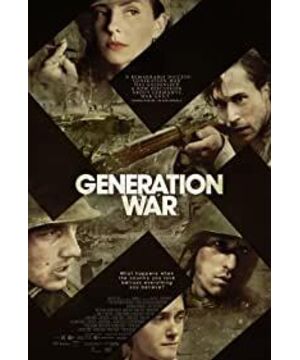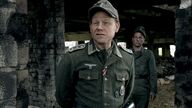Friends and relatives recommended this 2013 miniseries. Three episodes in total.
In 1941, five young men in Germany met in a tavern, they were Wilhelm and his younger brother Friedheim to join the German army. Wilhelm's lover Charlotte will also be a field nurse and is about to take to the field. And the Jewish Victor and his girlfriend Greta. At this time, the German Third Reich, under the leadership of Hitler, swept across Europe with the iron hoof of the Nazis, and was preparing to move towards the Soviet Union. On the eve of their departure, the five of them sang, danced, drank to celebrate, and enjoyed this incomparably glorious and romantic time. They both firmly believe that Germany will win by the end of the year. So we meet together for Christmas.
But the actual development and their wishes are completely different. After four years of unimaginable ordeals, the only three returning to the tavern were scarred and exhausted.
I've seen a lot of movies and TV shows about World War II. The usual themes are mostly artillery fighting, or impassioned anti-war, or grief and suffering. But this show gave me a different feeling. It also has battle scenes, it is also anti-war, and it also reveals the suffering of the Jews. However, the director did not take these stories people are used to seeing as the theme, and did not pay attention to how, but asked: why? Together with our audience, the choreographer is examining Germany, himself, and humanity. To this end, after watching this drama, I went to the Internet to find background information about this drama.
The preparatory period for this TV series lasted for ten years. It is based on the memories of German World War II veteran Wilhelm Wilhelm. The story is real, and the characters in the play are also real. In order to restore the history as accurately as possible, screenwriter Curtis traveled to many countries in Europe, visited a large number of parties, and shot more than 150 hours of material. After a year of editing and editing, he presented this 270-minute film to us. TV drama.
In the play, what caught my attention the most was Friedheim, a German soldier among the five. He is a young man who loves to read and has his own thoughts on things. At that time, the actions and thoughts of everyone around him were full of confidence that Germany would win, but there were some doubts and thoughts in his eyes. Therefore, in the beginning of the battle, he was not so brave and determined, and was mocked by his comrades as cowardly and cowardly. He hesitated before shooting, and he rescued the little Jewish girl who was captured by the Ukrainian auxiliary police. All of these are just to keep a little bit of good in my heart, in order to resist those ubiquitous evils. This is how Friedheim constantly struggles between good and evil. However, the forces of evil are so powerful that you have no choice. It doesn't allow you to be an upright person, and it doesn't allow you to stand on the sidelines. Step by step, he finally knew that he had failed. He had to "try not to think of himself as a human being" to numb his soul. After that, he began to do evil in accordance with the requirements of the German soldiers and the orders of his superiors. He participated in the execution of innocent villagers, he killed the girl who was running away, and he pulled the ropes from the gallows. No matter how you look at it, he has become a devil full of evil. The devil has taken possession of his body. Unlike most people in Germany, he didn't think it was for the revival of Germany, for the victory of the war, for the sake of glory, for the sake of justice. In his clear consciousness, he knew very well that this was a crime, that it was an evil deed, but he had to do it. This is the most painful. It was not until the last moment that he knew that he still had a choice, which was to let his soul disappear along with this evil skin. Friedheim did just that.
In a twisted environment, what brings people is not only the separation of relatives, the ruins of the streets, the lack of food. Nor is it exactly "this war will only bring out the worst of us". The most terrifying and unbearable thing is that invisible web of ideas. It was obviously backward, but it became advanced; it was obviously evil, but it became justice; it was obviously ignorance, but it became wisdom. You are in this big net, you either suffocate to death, or you become a rope in the big net. I remember that during the Bingwu period, a friend of mine once experienced the little bastard incident. Years later, he told his daughter about it. The daughter asked inexplicably, "Why were you so stupid back then?" He replied, "At that time, we were so stupid." In the play, what people encounter is this ubiquitous big net. It tells you all the time: "You have to serve the revival of Germany. You have to be loyal to the Führer. For the sake of our living space, you have to kill those Jews." Under the influence of these thoughts, you happily raise your arms high. Call: "Heil Hitler!" You happily spend the night of crystals, you go to occupy the Jewish home with confidence, and you volunteer to be cannon fodder to sacrifice your life heroically. All of this, most people do not have the slightest hesitation and doubt. Even if there are so few people who understand, their thinking is limited to thinking in this big net, and their behavior is not so much a forerunner as it is intuition. Until today, we have ushered in the return of rationality. Although it is very preliminary, it can be regarded as a small progress of human beings. Looking back on the past, I slowly had some remorse, although it was a little late.
In the play, we see that when the evil web is widely opened, it will also force out the remaining kindness of people. After witnessing everything on the front line and experiencing Martin's cruelty and ruthlessness, Greta shouted to people: "Germany can't win!" Victor opened the door of the car where the Jews were imprisoned under the watchful eyes of the anti-Semitic crowd. Greta and Victor are clearly aware that what awaits them next is death, but what they have to defend is something more precious than life. As mentioned above, even if their actions are only out of basic conscience and intuition, they are worthy of the respect of our younger generation.
Four years later, the surviving three finally reunite in the dilapidated tavern. Wilhelm took out three dusty wine glasses, filled them with wine, and the three of them clinked and drank silently. At this time, the joy of parting was reappeared in their minds. They were sad and desolate at this time. "When we first joined the army, we fought for the motherland. Later, when we began to doubt this, we fought for our comrades in arms. We can't leave our comrades in arms and ignore them, but if all our comrades in arms are dead, what will we do? You're alone." Instead of Friedheim dying for the remnants of a conscience, what are they left with now? Abandoning formerly absurd beliefs, what do you expect to fill your soul? Only emptiness remains. just to survive.
Like the director of this TV series, the current German people are seriously reflecting on the war and examining themselves. Compared with Japan's dead duck-mouthed thinking, this kind of courage is admirable.
The plot in the play is very thoughtful, and every detail echoes each other. There seem to be more coincidences, but after thinking about it carefully, it has to be the case. Although the overall plot describes suffering and sadness, each scene is very short, with frequent transitions, adding some lively atmosphere, and the dialogue is occasionally funny, such as: "The head of state said that winter will bring victory." "What year did he say?" It's not too dull to look at.
My rating: 9.0.
View more about Generation War reviews











